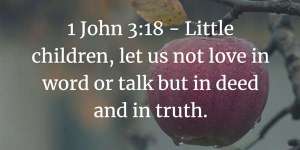“God’s Kind of Love”
(I was privileged to celebrate the wedding of two of my friends last weekend! Here is the meditation I gave at the wedding.)

1 John 4:13-17 (4:17) – November 15, 2025
Weddings are wonderful events. Brides and grooms try their best to make them meaningful, personalized, and one-of-a-kind! This is especially true about the music chosen.
I have strong feelings about certain songs that are featured at weddings. I won’t name any specific song, but I think you can recognize them when you hear them. I’m thinking of hearts and flowers, sappy songs that highlight love as a warm and fuzzy, surface-kind-of feeling. What happens when that warm and fuzzy feeling called “love” goes away?
We are here today to celebrate the wedding of our two friends. How wonderful, how fitting that we also talk about celebrating how much we love one another! Not a sappy, fuzzy kind of love, but a kind of love that goes the distance. A deep-down love that endures.
Many people, indeed, many ministers lift up the Bible reading from 1 Corinthians 13, where the Apostle Paul talks all about love. The “Love Chapter” from the New Testament is a wonderful statement about love.
I am a chaplain, and it’s part of my job description to talk about the Bible. How does the Bible describe love? I prefer the Apostle John and his marvelous description, his plain words on the subject of love – God’s love. Our Bible reading from the first letter of John written to his scattered church members describes love – the way God sees love. St. John writes: “Dear friends, since God so loved us, we also ought to love one another. 12 No one has ever seen God; but if we love one another, God lives in us and God’s love is made complete in us.”
Here in this description, St. John tells his friends all about love – God’s love. And, John raises love to the next level. Or, perhaps another way of describing it: John raises the bar for measuring love. “Since God so loved us, we also ought to love one another.”
When I think of the number one example of love, I think of our Lord Jesus, while He was here on this earth. I think of how Jesus lived, how He acted, and how He carried out His ministry. Jesus showed us how to love, by displaying love in action. Jesus truly showed His friends (as well as all the world) a life of love – and caring and compassion for all people.
What better thing to do than to think of our Lord Jesus, when He was here on this earth, and ask ourselves “What would Jesus do?” How would Jesus act? Who would Jesus love?”
In recovery circles, a common saying is “do the next right thing.” I had a friend in recovery, of blessed memory, who is now with the Lord. He always tried his very best to be loving, caring and giving. He knew that common recovery saying very well, except he would change one word. He would often say “do the next loving thing.” That’s how to fulfill John’s definition of love from 1 John chapter 4.
So – what would Jesus do? Do the next loving thing. Go. Do that.
Alleluia, amen.
(Suggestion: visit me at my other blogs: matterofprayer: A Year of Everyday Prayers. #PursuePEACE – and A Year of Being Kind . Thanks!


